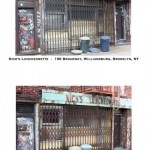blogosphere
If this is the best they've got, it's kind of sad, really.
Looks like the link to the zip file of what was left over from the 2009 release has been removed, just a few hours after the world became aware that the FOIA gang is at it again. But most of what found its way onto the web so far, tiny snippets without even a clue as to the subject matter that prompted the excerpts, doesn't ever rise to the level of lame.
Of course, that won't stop the denial punks from engaging in a display of juvenile histrionics. But still, after the embarrassment of the BEST study conclusions, it is beginning to…
Among the very best of the science-oriented blogs I try to read regularly is Tom Levenson's Inverse Square Blog. Tom, who teaches science journalism at MIT, isn't a climatologist, but whenever he writes about climate science or politics, it's usually worth a look.
Apparently, the folks at Scientific American agree, and they recently invited Tom to contribute a guest post to the magazine's blog site. It's primarily about the recent kerfuffle over the possibility that neutrinos might be able to travel faster than light, and a bit on the lengthy side, but he does manage to work climate in…
Recently, Scienceblogs/National Geographic decided it would no longer host pseudonymous science bloggers. As a result, many of my former colleagues have left. I think this decision was wrong. Read on for my reasons.
One: simple fairness. Several well-established pseudonymous bloggers had been active here for years. While it's perfectly reasonable to set up a media site from scratch and institute a "no pseudonymous blogging" policy at that time, it's quite another to change the rules and evict members of an established community. It violates my sense of fairness; it's why we usually expect…
Photo of Vermont highway courtesy of Kyle Cornell
Last week, I had my long-awaited vacation semi-ruined when, thanks to Hurricane Irene, my flight back from the West Coast was cancelled. I had to rent a car and drive across the country in a rush - not my favorite way to spend three and a half days. But based on what I saw passing through New York, and what I've heard about the damage in Vermont, I can't complain: flooding has overturned homes, isolated entire towns, and destroyed everything some families own.
Vermonters are a notoriously self-sufficient bunch, and I haven't seen that much…
Gold Cortex
16 x 20, 2010
Greg Dunn
I used to have a beautiful gold Japanese folding screen, which was purchased by my great-grandmother's feisty sister on a trip in the 1920s. I loved the gold patina and the surprisingly modern impact it had on my wall. At the moment, it's loaned to a friend, but looking at Greg Dunn's artwork, I couldn't help but be reminded of the best aspects of my screen: the gold leaf, crisp black patterns, and way that the scene seemed half natural, half abstract.
The biggest twist Greg, a 6th year graduate student in neuroscience at the University of Pennsylvania,…
In a guest post at Scientific American, Rebecca Jablonsky says,
Kuhn de-legitimized the understanding of science as implicitly including objective reality, leaving room for theory to de-stabilize rituals of practice and produce authentic innovation-something that is certainly prized in both artistic and scientific communities alike.
Seriously - go read it and come back. It's short. I'll wait.
So I don't get it. While Jablonsky's post is well-written and thoughtful, and I basically agree with everything she says, and find the concepts interesting, I can't figure out who the post is intended to…
FYI: longtime blogger-artist Glendon Mellow has teamed up with Kalliopi Monoyios to start a new artscience/sciart blog, Symbiartic, for Scientific American's blog hub. For a taste, check out this post on why cameras won't replace artists anytime soon.
Nick's Luncheonette
Randy Hage
Via the eye-candy blog How to Be a Retronaut (thanks Miles for first sending me a link there), the painstakingly accurate miniature Manhattan streetscapes of LA artist Randy Hage are half-toy, half-historical document - a wonder cabinet of urban curiosities.
Hage's overarching goal is to preserve rapidly disappearing streetscapes. As he told Jeremiah Moss at Vanishing New York,
I remember one instance in particular that prompted me to seriously focus on this project. I was on my way to revisit a Brooklyn donut shop that I had photographed a year earlier. I…
This 1967 IBM propaganda film, "Paperwork Explosion," couples an eerily deadpan refrain of "more time on paperwork," with a creepy pseudo-country neighbor* urging us to embrace Progress.
The film's frenetic soundtrack and abrupt transitions embody the familiar hysterical nervousness of an increasingly automated era, while striving the whole time to convince us that technology will relieve the pressures of the modern workplace, allowing us to "think" instead of "work". Looking back, of course, it's clear that technology instead cranked the pressure up. If writers like Nicholas Carr are to be…
One of the much-hyped benefits of social networking is that it provides a way to get personalized recommendations about businesses from a wider network. If I want to tell the world that the coffee place in my neighborhood has the best cappuccino this side of Seattle, I can do that (and it does)! That's what Yelp is for - right?
Well, not quite. I realized a while ago that my reviews don't show up on Yelp anymore. They've been "filtered" from the site, like thousands of other users' reviews. Yelp won't explain why (they say if they did explain the algorithm, it would allow merchants to game…
minouette of magpie & whiskeyjack has posted an interesting meditation on the resemblances between Katie Scott's whimsical faux-botanical/biological atlas pages (above), the illustrations of Ernst Haeckel (whose portrait minouette just finished), and the Codex Seraphinianous. It's a harmonious grouping of artistic influences - check it out.
Former Scibling Sheril Kirshenbaum, late of the Intersection, has moved to a new blog: Convergence. Let's be honest: most of us are about intersections, convergences, confluences and whatnot; I've often described BioE as "the intersection of art & science." But Sheril's kicking the metaphor up a notch:
Convergence is a forum to explore all sorts of topics, but the primary focus will be the interdisciplinary nature of understanding our world. For example, if we aspire to protect biodiversity, we must address social issues. Boosting fisheries requires economics. Tackling our tremendous…
I was playing The Fracking Song last night about midnight, and my boyfriend was grooving to it. At the end he asked, "what was that about?" "Uh. . . fracking."
"Which kind of fracking?"
Yes, we are a BSG household.
Anyway, it may be an explainer, but it's actually quite a nice little piece of music too. And I'm a sucker for good typography any day.
Is your fracking attention span longer than 2:33? Then go dig around in ProPublica's fracking investigation. "The Fracking Song" is by members of Jay Rosen's NYU graduate journalism class. Nice work, guys!
From Linda Holmes, a poignant post about how the deluge of information makes it impossible to scratch the surface in a single lifetime:
there are really only two responses if you want to feel like you're well-read, or well-versed in music, or whatever the case may be: culling and surrender.
Culling is the choosing you do for yourself. It's the sorting of what's worth your time and what's not worth your time. It's saying, "I deem Keeping Up With The Kardashians a poor use of my time, and therefore, I choose not to watch it." It's saying, "I read the last Jonathan Franzen book and fell asleep…
I've been remiss in not recommending my temporary Scienceblogs scibling "Art and Science Learning" to those of you who are, like me, interested in the sciart intersection. However, I have to say I am not 100% behind its latest (and quite popular post), by Robert Root-Bernstein. It starts,
Most people are at a loss to be able to identify any useful connections between arts and sciences. This ignorance is appalling.
Hmmm. Do you think that's really true, much less "appalling"?
I'm not so sure. I do think it's true that people tend to view arts and sciences as distinct disciplines, which is…
Yesterday, bioephemera got its one millionth visit.*
Thanks so much to everyone who reads, shares, and enjoys my posts - you're why I keep blogging, in whatever spare time I can find. There's just too much interesting stuff out there to keep it to myself when I find it, and I've met far too many fascinating and brilliant people who defy categorization by doing this. . . you know who you are.
Rabelais was gloriously learned because learning amused him, and so far as I am concerned, that is learning's best justification. Not the only one, but the best. --Robertson Davies, The Rebel Angels…
Remember when I said more bio grad students should play with coding and modeling? Here's an example of what I mean. Laurence Frabotta directed me to this animation by phylogeneticist/bioinformatics programmer Liam Revell, an assistant professor at U Mass Boston, who used the statistical package 'R' to write a short code generating all possible bifurcating and multifurcating phylogenetic trees for a set of taxa. Apparently there are 2,752 for seven taxa (I have to take his word for it, my basic math skills have long since escaped me) and this animation runs through all of them. It's not…
Wow - my post about unhappy bio grad students is getting massive traffic. (Hi SlashDotters and StumbleUpon-ers!) Mike the Mad Biologist, my original inspiration, has responded here and here to all the buzz.
I pretty much said everything I wanted to say in the original post, and I don't pretend to have an explanation or cure for this problem. But I see that there's been some snarkiness on the intertubez (shocking!!!) while I was away watching the developments in the Myriad appeal. So I want to clarify two points.
First, let me emphasize that I'm not saying graduate students in other fields don…
We can't seem to stop thinking about nuclear power. Given what's at stake -- the biosphere, the economy, our genetic integrity -- this is understandable. But I think too many are getting distracted from the fundamental problem with splitting atoms and arguing scientific questions we are unlikely to resolve anytime soon.
Much of the recent hand-wringing is a reaction to George Monbiot's quasi-conversion to a nuclear power advocate. His latest column, Evidence Meltdown, practically radiates scorn for the "anti-nuclear movement," which he manages to reduce to a monolithic cult led by Helen…
Tomorrow morning, a three-judge panel of the Court of Appeals for the Federal Circuit will hear arguments in the appeal of Association for Molecular Pathology v. U.S. Patent and Trademark Office - better known as the Myriad gene patent case.* It has the patent and genetic blogospheres in a bit of a tizzy, and the mainstream media is picking up on it too. See, for example, this Atlantic article by Andrew Cohen, this Nature.com editorial by my friend Shobita Parthasarathy, and even a "Spectator's Guide to the Myriad Oral Argument" by Genomics Law Report -- which has a dedicated icon and…

